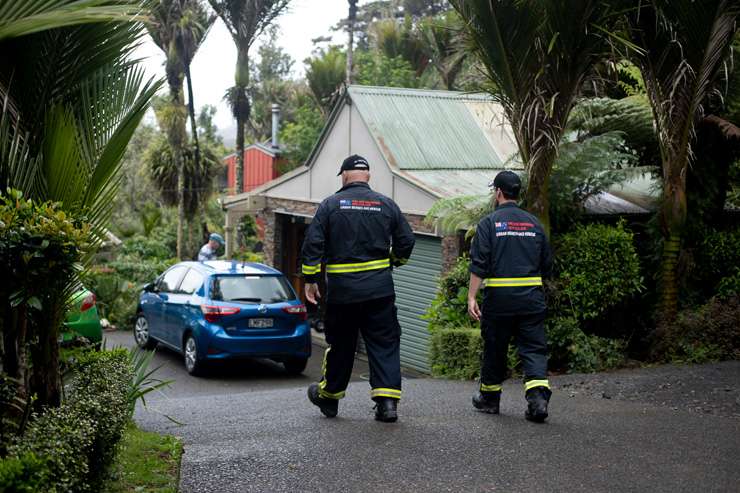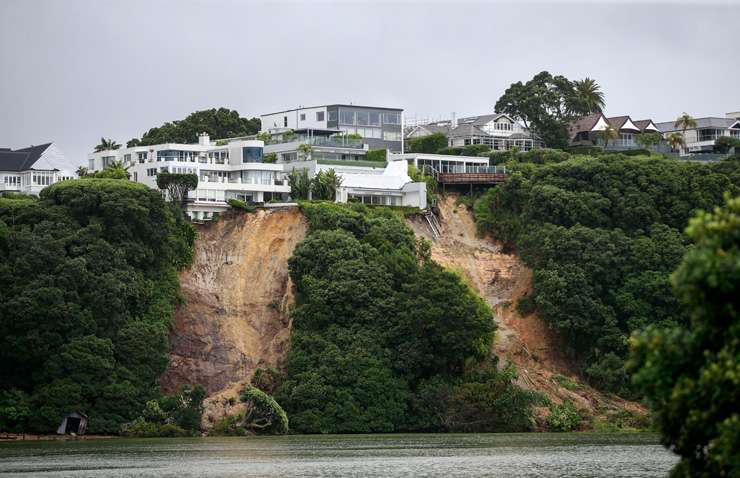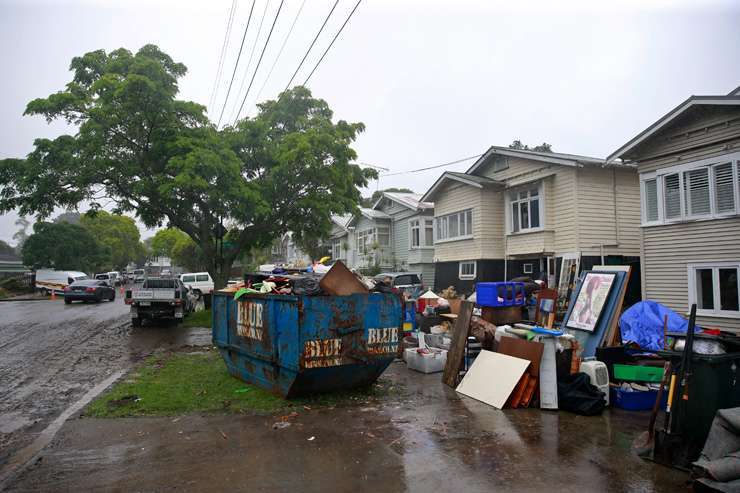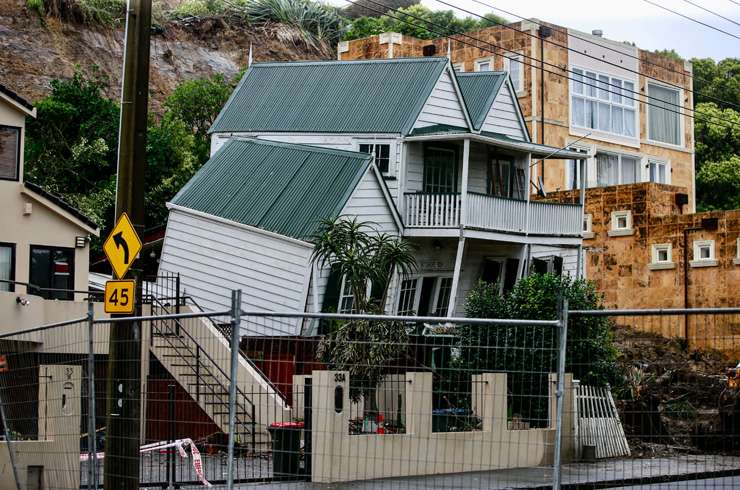Auckland house-hunters will start demanding more in-depth information about the house they are buying and might even change their minds about what and where they want it, property experts say, after the devastating Auckland floods left some houses hovering on the edges of cliffs and forced other homeowners out of their submerged homes.
A number of properties currently listed with Ray White Remuera have been impacted by the recent flooding and salesperson Ben Ryken said many of these were either on big piles or had been built on manmade structures on pretty sketchy land.
Earlier this week Auckland Council confirmed at least 168 houses had been red-stickered and deemed uninhabitable, 300 had yellow stickers due to concerns about the building’s performance and 720 properties had white stickers to indicate there is minor damage but are safe to be lived in.
“A lot of our sellers have been red-stickered unfortunately. Places in Hillsborough, out west – places that our office still sells in.”
Start your property search
Real estate agents are now working with some of those sellers who are making the tough calls about whether to pull the property off the market, delay the campaign or continue on.
Read More:
- Auckland flood damage: What are your legal rights?
- What happens if your home gets hit with a red sticker? Is it all over?
- Advice for sellers: ‘If they try and hide it, they’re asking for trouble later on’
“There was a property this morning [Tuesday] that had a slip just below it so there was a buyer interested to throw a bid at auction this week but it has been postponed at least until further notice because people are wanting to get geotechnical reports.”
And it is that level of due diligence – above the usual building report and legal checks – that he expects to see more of.
“I think we will start to see a bit more money spent and a bit more due diligence from our buyers going forward and that’s going to affect the market given people don’t want to be spending $5000 to $100,000 a pop on every property they see to have a chance of buying it,” he said.

Members of FENZ Urban Search and Rescue assess red-stickered homes in Titirangi, West Auckland. Photo / Dean Purcell

Large slips and erosion at Hobson Bay on Auckland's waterfront. Photo / Alex Burton
“Most people do get building inspections for properties to see the structural integrity of the actual property itself – the house and how it’s constructed, but I think we will find after this that more investigation into the structural integrity of the land that the house is built on.”
The latest floods could also start to impact what and where people buy and might even see some people move away from what have been very desirable areas due to being close to the beach or having views, he said.
“When videos and photos are going around of places in Titirangi and Hillsborough having slips and decks falling off houses – it does make you think twice about buying in those areas. So perhaps we will see an increase in interest in properties that are inland – whatever that means in Auckland.”
Property lawyer Thomas Gibbons said the latest natural disaster could create more uncertainty in the market and people will be asking a lot more questions around flood risks and features such as grass, storm water system and rain gardens that help a property drain.
“Purchasers are going to want to look more closely at issues like flood risk. They will appear on LIM reports in some cases – there will be a note there that there was a flood risk in relation to the property,” he said.

Residents in Grey Lynn clean up in the aftermath of the storms and flooding over the weekend. Photo / Alex Burton

A house on Shore Road, in Remuera, after heavy rain caused landslips and widespread destruction across Auckland. Photo / Alex Burton
“In Auckland it’s really tragic that some properties are affected more than others and there’s obviously a range of reasons for that. People will want to ensure there’s resilient infrastructure in place across all our areas.”
New Zealand Geotechnical chair Eleni Gkeli urged anyone buying a property to look at the potential effects of natural disasters as part of their due diligence, especially as the aggravating effects of climate change continue to affect communities and disrupt lives.
Gkeli said often the risks can sometimes only be identified by an appropriately qualified professional and different engineers should be engaged to identify the different risks.
For example, an environmental and water engineer is needed to assess the flooding risk for a property and whether the existing storm water system can cope, structural engineers assess the condition and likely performance of the buildings in the different events, and geotechnical engineers to assess hazards such as land stability, retaining walls, earthworks and adequacy and completeness of existing consents.
Valocity head of valuations James Wilson said it took large events to impact people’s property decision-making criteria and the severe flooding in Auckland could be one of them.

Valocity head of valuations James Wilson: "You can’t conclude that all cliff-top property will suddenly become undesirable because it simply won’t." Photo / Fiona Goodall
“It’s early days, but what we are hearing anecdotally now is that buyers want information and a lot of that information will come in the form of data – things of that nature that help buyers access what the impacts might be.”
And while people will definitely be asking more question around the flood risks, Wilson said it is far too early to tell whether those properties more at risk will drop in value.
“We need to see will buyers shy away from suburbs now because there was more flooding than other suburbs. The logical answer would be yes, but again New Zealand is plagued a wee bit by the fact that we just don’t have the luxury of so many properties available to buy so that scarcity does come along and people over time do begin to ignore those risks more and more,” he said.
“You can’t therefore conclude that all cliff-top property or all coastal property or all riverside property will suddenly become undesirable because it simply won’t, but will more buyers prioritise those risks now? They should do and again the only way they can really do that is by getting their hands on whatever data available – whether it be maps of this is the area that was impacted or actual property specific engineer reports or things like that.”
But Barfoot & Thompson agent Ying Li Howe, who specialises in West Auckland, believes that the current financing rules will have a bigger impact on the property market.
In fact, the flooding actually encouraged more first-home buyers to start looking, she said.
Between five and six groups turned up to her open home for a four-bedroom, two-bathroom property at 23 Archibald Road in Kelston at the weekend – the biggest numbers Howe has seen at any of her open homes so far this year.
The people who turned up to the open home told her they are currently renting and their neighbour's properties had either flooded or their home wasn’t feeling that cosy in the extreme weather so they had decided to start looking.
However, Howe said these people aren’t in a rush as some are still hoping house prices might continue to drop and others were waiting until the new announcement around the OCR scheduled for the end of next month.



















































































